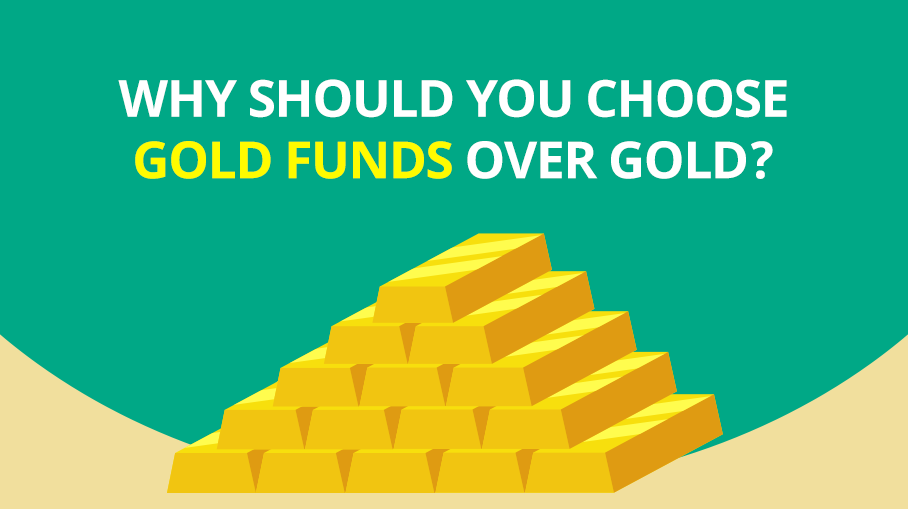Investing in gold mutual funds is a popular choice for Indian investors looking to diversify their portfolios and hedge against inflation. Gold has long been considered a safe-haven asset, and with increasing global economic uncertainties, many investors are turning to gold-backed mutual funds as a reliable investment option.
In this guide, we explore the best gold mutual funds in India for 2025, their benefits, and how to choose the right one for your financial goals.
What Are Gold Mutual Funds?
Gold mutual funds are open-ended mutual funds that invest in gold ETFs (Exchange-Traded Funds) or gold mining companies. Unlike physical gold, these funds eliminate concerns related to storage, security, and purity while providing investors exposure to gold prices.

Benefits of Investing in Gold Mutual Funds
Investing in gold mutual funds offers several advantages over traditional gold investments. Whether you’re looking for portfolio diversification, inflation protection, or long-term wealth creation, gold mutual funds can be a smart investment choice. Below are the key benefits explained in detail:
1. Portfolio Diversification
Gold has a low correlation with equity markets, meaning when stock markets decline, gold prices often remain stable or increase. This makes gold mutual funds a hedge against market volatility. By including gold in your portfolio, you can balance the risks of stock investments and create a more resilient financial plan.
2. Inflation Hedge & Wealth Preservation
Gold is known as an inflation-resistant asset because its value tends to rise when the purchasing power of currency declines. Historically, during economic crises or inflationary periods, gold prices have surged, making it a safe haven for investors seeking to preserve their wealth.
3. No Storage or Security Concerns
Unlike physical gold, which requires safe storage, security arrangements, and insurance, gold mutual funds eliminate these concerns. You don’t have to worry about theft, purity issues, or making space for storing physical gold bars or coins.
4. High Liquidity & Convenience
Gold mutual funds can be easily bought and sold online through mutual fund platforms or brokerage accounts. Unlike physical gold, which involves additional costs for selling and purchasing, gold mutual funds offer seamless transactions, making them a more liquid and accessible option.
5. Professional Management & Transparency
Gold mutual funds are managed by professional fund managers who monitor market trends, optimize holdings, and ensure that the fund tracks gold prices efficiently. Investors also benefit from the transparency of mutual funds, with regular updates on Net Asset Value (NAV), holdings, and fund performance.
6. Systematic Investment Plan (SIP) Option
Many gold mutual funds allow investment through SIP (Systematic Investment Plan), enabling investors to buy units in small amounts regularly. This helps in rupee cost averaging, reducing the impact of market volatility and making gold investment more affordable.
7. Tax Benefits & Long-Term Gains
Gold mutual funds are more tax-efficient than physical gold investments. Here’s how taxation works:
- Short-Term Gains (less than 3 years) – Taxed as per your income tax slab.
- Long-Term Gains (more than 3 years) – Taxed at 20% with indexation benefits, which significantly reduces tax liability compared to physical gold where gains are taxed as per individual tax slabs.
8. Lower Costs Compared to Physical Gold
Physical gold purchases often involve additional costs such as making charges, wastage, and storage expenses. In contrast, gold mutual funds have a lower expense ratio, making them a more cost-effective alternative.
Top Gold Mutual Funds in India (2025)
Here are some of the best-performing gold mutual funds in India based on historical returns, fund size, and risk-adjusted performance:
1. SBI Gold Fund
- Fund Type: Fund of Fund (FoF)
- Expense Ratio: ~0.55%
- 3-Year Returns: ~11.5%
- Why Invest?: One of the most stable gold funds with low tracking error and high liquidity.
2. HDFC Gold Fund
- Fund Type: FoF investing in HDFC Gold ETF
- Expense Ratio: ~0.80%
- 3-Year Returns: ~12.2%
- Why Invest?: Strong past performance and a reputed fund house make this a good choice for long-term investors.
3. ICICI Prudential Gold Fund
- Fund Type: FoF
- Expense Ratio: ~0.60%
- 3-Year Returns: ~10.8%
- Why Invest?: Offers a balanced approach with moderate risk and strong returns.
4. Nippon India Gold Savings Fund
- Fund Type: FoF investing in Nippon Gold ETF
- Expense Ratio: ~0.90%
- 3-Year Returns: ~11.0%
- Why Invest?: Higher risk-adjusted returns and excellent liquidity.
5. Axis Gold Fund
- Fund Type: FoF
- Expense Ratio: ~0.75%
- 3-Year Returns: ~11.7%
- Why Invest?: One of the most consistent performers in the gold fund segment.
How to Choose the Right Gold Mutual Fund?
Selecting the best gold mutual fund requires careful evaluation of multiple factors. Here’s a detailed guide to help you make an informed decision:
1. Expense Ratio – Keep Costs Low
The expense ratio represents the annual fee charged by the fund house for managing your investment. A lower expense ratio ensures that a greater portion of your returns stays with you. Ideally, look for funds with an expense ratio below 1% for optimal cost efficiency.
2. Past Performance & Consistency
While past performance does not guarantee future success, analyzing 3-year, 5-year, and 10-year returns helps in identifying funds with consistent performance. Compare the historical returns of different funds to see which ones have outperformed their peers.
3. Fund House Reputation & Management
Choosing a fund from a well-established Asset Management Company (AMC) with a strong track record ensures reliable fund management and lower risk. Look for fund houses with a good reputation, transparent policies, and experienced fund managers.
4. Tracking Error – Accuracy of Fund Performance
Gold mutual funds invest in gold ETFs, and their performance should closely track gold prices. A lower tracking error (difference between fund returns and gold price movements) indicates a more efficient fund that accurately follows gold prices.
5. Investment Horizon – Short-Term or Long-Term?
- If you’re investing for short-term gains (1-3 years), choose funds with lower volatility and quick liquidity.
- For long-term investment (5+ years), select funds with a history of consistent performance and stable returns to benefit from market cycles.
6. Fund Size & Liquidity
A fund with a larger Assets Under Management (AUM) usually indicates higher liquidity and stability. Funds with greater AUM attract more investors and provide smoother buy/sell transactions, reducing market impact costs.
7. Tax Efficiency & Holding Period
- If you plan to hold for less than 3 years, be aware that short-term capital gains (STCG) are taxed as per your income slab.
- For long-term investors (above 3 years), choosing funds that offer indexation benefits can significantly reduce tax burdens.
8. Mode of Investment – SIP vs. Lump Sum
If you’re unsure about the right entry time, starting with a SIP (Systematic Investment Plan) can help you average out market fluctuations. However, if you have a lump sum to invest, consider funds with strong past performance and stability.
9. Risk Assessment – Volatility & Market Trends
While gold is traditionally considered a safe investment, short-term price fluctuations may impact returns. Investors with a low-risk appetite should opt for funds with a balanced risk-return profile, while aggressive investors can take calculated risks for higher returns.
Final Thoughts
Gold mutual funds offer a secure, tax-efficient, and hassle-free way to invest in gold without the burden of physical storage. Whether you’re looking to hedge against inflation, diversify your portfolio, or make a long-term investment, choosing the right fund based on performance, expense ratio, liquidity, and tax benefits is crucial.
With multiple gold mutual funds available in India, evaluating these factors will help you make a smart, informed, and profitable investment decision in 2025.
Frequently Asked Questions (FAQs)
Q1: How are gold mutual funds different from gold ETFs?
A: Gold ETFs are traded on stock exchanges and require a Demat account, whereas gold mutual funds can be invested in directly without a Demat account.
Q2: Can I start a SIP in gold mutual funds?
A: Yes, many gold mutual funds offer SIP options starting from ₹500 per month, making them accessible to all investors.
Q3: What is the best gold mutual fund in India?
A: Top-performing gold mutual funds include SBI Gold Fund, HDFC Gold Fund, ICICI Prudential Gold Fund, and Axis Gold Fund, based on historical returns and low expense ratios.
Q4: Are gold mutual funds safe for investment?
A: Yes, they are regulated by SEBI and provide secure investment options without the risks of handling physical gold.
Q5: Can I redeem my gold mutual fund investment anytime?
A: Yes, gold mutual funds offer high liquidity, allowing investors to redeem their investments at any time.



wl6sae
51wyo4
naturally like your website however you have to take a look at the spelling on several of your posts. Many of them are rife with spelling issues and I to find it very troublesome to tell the truth nevertheless I’ll certainly come again again.
You have observed very interesting points! ps decent web site. “‘We’re always lucky,’ I said and like a fool I did not knock on wood.” by Ernest Hemingway.
Thanks, I have recently been looking for information approximately this subject for a while and yours is the best I’ve found out till now. But, what about the conclusion? Are you sure concerning the supply?